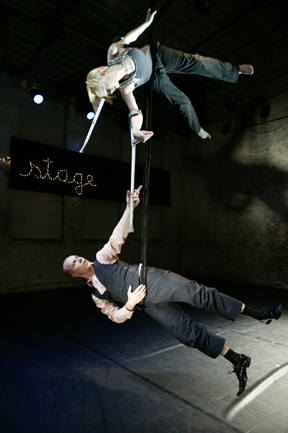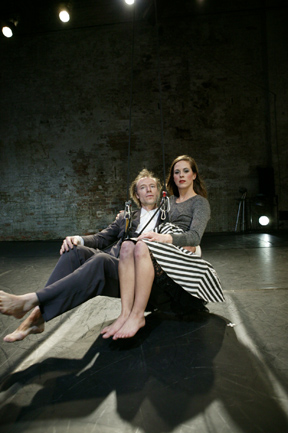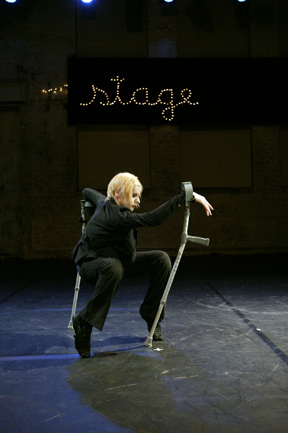A Lot of Talent and an Open Mind
Jess Curtis/Gravity
"Under the Radar"
Counterpulse, SanFranscisco
March 30, 2007
copyright © 2007 by Paul Parish
 Jess Curtis, who was one of the seminal post-modern dancers here in the 90's, has returned to San Francisco on a half-yearly basis after moving to Berlin and is bringing us periodically absolutely fascinating, and deeply refreshing, bursts of intelligence from those quarters. For a post-modernist, he's always had an old-fashioned respect for his audience. He was getting into circus before he left — he's always respected skill and the average intelligent person's appreciation of skill.
Jess Curtis, who was one of the seminal post-modern dancers here in the 90's, has returned to San Francisco on a half-yearly basis after moving to Berlin and is bringing us periodically absolutely fascinating, and deeply refreshing, bursts of intelligence from those quarters. For a post-modernist, he's always had an old-fashioned respect for his audience. He was getting into circus before he left — he's always respected skill and the average intelligent person's appreciation of skill.
Curtis has adopted (after seeing Pina Bausch?) the cabaret tradition, which has much more to offer, I suspect, than Forsythish hyperballet — though like hyperballet cabaret banishes the middle ground of the rational world and leaves us the surreal juxtaposition of fragments and extremes. But Curtis (and his largely German collaborators) seems to go deeper than Bausch into the low arts, the hurdy-gurdy places that Beethoven and Schubert were already exploring at the ends of their lives. At several points in the show, I found myself overwhelmed, my hair actually standing on end, as when the faint familiar strains of an aria from "The Messiah" seeped through the sonic mayhem of simulated machine-gun fire during the most chaotic section of the piece.
There are echoes of Brecht in "Under the Radar," especially Curtis's use of the Verfremdungseffekt (which makes something familiar look as if you'd never seen it before) — and also of Brecht's frequent musical collaborator, Kurt Weill, which were brought out by the first-rate musicians. But the overall tone of this is sweeter, and the S/M overtones frequently turn towards tenderness.
The show ran for four weekends at Counterpulse, a hole-in-the-wall space on the ground floor of a commercial building across the street from the Salvation Army; the house seats 75 at the most, in risers at the back wall. A band-stand stood at the other far wall, with a cute little string of lights spelling out "Band" that would come on when the band played, and a bar with a similar string of lights over it reading "bar": we were encouraged to buy drinks early and often, and throughout the opening number the bartender built houses of cards on her counter, which of course collapsed and got rebuilt. The rest of the floor was playing space. A trapeze hung stage right and got very imaginative use.
This kind of theater makes you use your imagination, and Curtis's greatest gift is his ability to present material so entertainingly that you're interested in it both now while you're looking at it, and also in prospect, as you wonder what's going to happen, and often wondering what in fact is the sex of the person you're looking at, or if the disabled dancer up front at the moment is in fact as unable to keep still as she claims she is. (It's not so; she has considerable powers of NOT pulling focus when her turn is over.)
OK I should have told you already. This dance includes smoking; the greatest artist is a juggler, and some of the dancers are in wheelchairs or on crutches. But it will NOT be politically correct. Curtis knows what he's doing, and in particular he's a Zauberer, a magician, and knows when to pull his rabbits out of his hats.
 Deep down it did not surprise me to hear "How beautiful are the feet of him who brings glad tidings of peace" float down from that trapeze, asserting itself quietly in the midst of awful sonic mayhem. The battle-scene erupted like a nightmare in a Tchaikovsky symphony at the end of and tender aerial duet for Curtis and the soprano (Claire Cunningham), who was also a dancer despite her having to use crutches to move around. As they'd separated, Curtis had left her sitting in the trapeze and had kissed her feet - whereupon all hell had broken loose sonically, the lights went nearly black, and a half-naked dancer, legs and white underwear showing, had dived into the middle of the floor and begun alligatoring through a no-man's land.
Deep down it did not surprise me to hear "How beautiful are the feet of him who brings glad tidings of peace" float down from that trapeze, asserting itself quietly in the midst of awful sonic mayhem. The battle-scene erupted like a nightmare in a Tchaikovsky symphony at the end of and tender aerial duet for Curtis and the soprano (Claire Cunningham), who was also a dancer despite her having to use crutches to move around. As they'd separated, Curtis had left her sitting in the trapeze and had kissed her feet - whereupon all hell had broken loose sonically, the lights went nearly black, and a half-naked dancer, legs and white underwear showing, had dived into the middle of the floor and begun alligatoring through a no-man's land.
This noise was one of the effects created by "Matt Hermann and the coin Slots," who'd opened the show looking like a house band but clearly have many more strings to their bow. The little platinum blonde punker with the crutches turned out to be a very high soprano with excellent intonation, and Joerg Mueller, the juggler can play the clarinet extremely well. In fact, he's a theater artist of that rare, wonderful kind who can do whatever's necessary and never telegraph what's coming, so whenever he's up front you're lost in wonder.
Generally speaking, the show is set up to make you wonder, and to modulate the tempo of your wondering. Like you wonder, is this person male or female, sometimes for a LONG time. And you wonder, indeed till the show is over, exactly what is the disability of the English girl, Kaz Langley — is it cerebral palsy, maybe? And though she says early on, talking to the bartender, "I can't keep still" — it takes the bartender a long time to make this out, since she has trouble speaking, and the bartender's impatience makes it twice as hard to finish the sentence — which just puts you in mind of how difficult it ALWAYS is trying to communicate with someone who's impatient, as in trying to speak a language you hardly know over the phone. We do notice later, when the focus has moved on to another performer, that she CAN keep still just fine. And she never has any difficulty negotiating a straight line, and all her geometry is very pure, so just how disabled IS she?
At the very beginning, and for quite a while, I thought Langley was a guy — since the way she held her mouth looked like a man's, and I've never seen a woman gape in that way, but it's not odd for a guy to leave his mouth hanging open in that fashion. Which somehow kept me from noticing that she has large breasts (she was wearing a grey leotard, which did not hide them)....
 The show came in two acts, a variety show of bits, but with a sub-text, rather like the way that Abbey Road is an album of songs, but you feel that there's a deep underlying dramatic curve to the whole.
The show came in two acts, a variety show of bits, but with a sub-text, rather like the way that Abbey Road is an album of songs, but you feel that there's a deep underlying dramatic curve to the whole.
The very best stuff involved Joerg — which included a duet with Jess, which was presented as if it were on Comedy Central, with a voice-over commentary by the bartender and the other able-bodied (and very pretty) girl, who continually made fun of them — "O look, here's a canon moment" " The bald guy is REALLY bald, huh?" "Uh-oh — the old guy's got his feet too far apart, what's up with that?" "It's the stiff dance — they're both too old to be doing this." Somewhere in the middle the two disabled women on the sofa down right came in for commentary from the heartless girls: "Yeah Blondie is getting excited." "Oh, and the skinny girl's starting to tremble — but that's what she does is shake, right?"
Which completely disabled the politically-correct response and left us free to marvel at them all — it was like one of the great operatic quartets, the one in Fidelio or Rigoletto, where each participant is lost in lost in feeling but none of them jibe. This rollicking commentary is extremely necessary, to keep the show from being politically correct.
Indeed, the show even had a moment of SMOKING — Joerg did an unbelievable trick, took a cigarette out of a pack with his left hand threw it around the back of his head and caught it in his mouth, detected with his tongue that the filter was on the wrong side, turned the fag around in his mouth with his lips and teeth, then lit a match, threw IT around the back of his head, caught it in his mouth and maneuvered it with teeth and tongue so he LIT THE CIGARETTE, and then the bartender put her sweet cherry lips over the match, still burning in his mouth, closed over the flaming tip and took it from him into her mouth, and after 10 seconds blew smoke into his eyes.
I have rarely in my life seen more delicate and attentive partnering than happened over and over again in this show; Jess had a lovely duet with the crutch-girl, also up a soft trapeze, and used the crutch like a punt-pole, to start the whole enterprise to turning....
There was a beautiful tango, played by Matthias solo on an electronic keyboard but sounding like 3 pianists, for three couples, the two able-bodied girls dancing together; Jess offered his hand to "Blondie" with exquisite courtesy, while Joerg circled his partner with marvelous style. Another fantastic episode was the sextet for 3 dancers and three sets of crutches, which turned each soloist into a duet — it was very rond de jambe-y, and swept around the floor, and the crutches were used to truly fascinating effect, to create momentary support, sometimes very fleetingly, but with that fantastic tact that Fred Astaire could bring to the hat-rack or other inanimate object he would sometimes do a dance with.
Wonderful what you can do with a lot of talent and an open mind.
The other participants were Ulrike Bodammer, Claire Cunningham, Maria Francesca Scaroni, and P. Simms on drums
Photos by Sven Hagolani.
Volume 5, No. 14
April 9, 2007
copyright ©2007 by Paul Parish
www.danceviewtimes.com